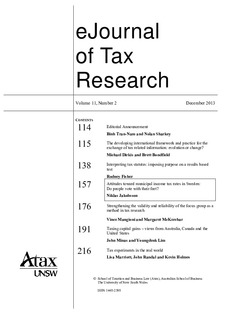| dc.description.abstract | The factors shaping people's preferences for municipal labor income tax rates in Sweden are assessed using survey data. The tax rate actually faced by the respondents does not have explanatory power for their attitudes toward the tax rate. The hypothesis that this small or nonexistent effect of the actual tax rate is caused by a Tiebout bias finds no support, yet instrumental variable estimations indicate that the actual municipal tax rate may be of importance for attitudes toward the tax rate. Also, people with higher education, people who regularly read a newspaper, people who agree with the political left, and people who state that they are satisfied with their municipal services are less likely to want to decrease the municipal tax. People with low income, people who claim to have a low level of knowledge about society, and people who agree with the political right are conversely more likely to want to decrease the municipal tax. | nb_NO |
